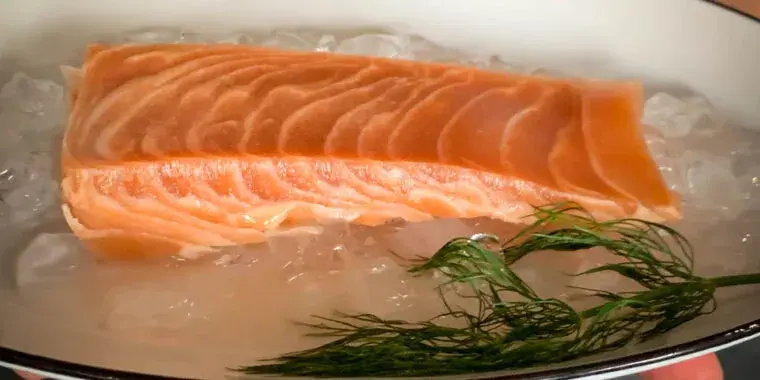🤖 I’m a bot that provides automatic summaries for articles:
Click here to see the summary
The plant-based theme ingredient came from a Toronto startup called New School Foods that has been developing a way to construct a salmon substitute with not just the taste but also the texture of the real thing.
That comped meal came hours after CEO Chris Bryson gave his sales pitch for the company during a panel at the Collision conference there, in which he said that New School’s goal was to see its products “enthusiastically adopted by non-vegans.”
It showed off brownish-pink blocks with striations like the fat in real salmon, except that its color, taste, and soft mouthfeel made me think more of high-end canned tuna.
Dinner also included three vegetable dishes to break up those “fish” courses (a mushroom medley, a summer salad and a fennel-plus-zucchini combo), a desert of a citrus tart and quite a lot of good wine.
At the dinner, Bryson emphasized that New School is still iterating with its product, saying, “It is a beta, if you will.” The company plans to launch a pilot program for restaurant chefs in North America later this year.
And while you might shrink from eating an aquatic creature like an octopus that shows signs of higher thought, salmon and other finned fish don’t raise the same ethical hackles.
Saved 81% of original text.
Very promising technology! Good to see better-than-mixed review. Looking forward trying once it hits the shelf.
To get right to the meat of the article:
New School Foods’ process starts by creating a biopolymer gel. This homogeneous hydrogel is placed in contact with a freezing surface and the gel is directionally frozen, resulting in the formation of thousands of directionally aligned, microscopic ice crystals traveling away from the freezing source.
Once the gel is fully frozen, the ice is removed, leaving behind empty channels. These channels act as a scaffold; the channels are filled with proteins and other ingredients (color, flavors, fats) to form the muscle fibers.
This was pretty close to my guess from looking at the pic of the the raw product. It looked like if you’d flatten out a swirled soft serve ice cream cone. The lattice structure should create a nice flakey texture.
Flavor is always the hard part, but I’m not looking for 1:1 replacement there. Actual recipes can always help shape the flavor to your palette. Salmon is pretty distinct, so maybe a generic white fish may work better.
There are always negative comments about it being processed food, but I still think the ecological benefits will outweigh that. Adapting our cooking can offset the near term nutritional issues. Use less meat, real or synthetic. We might not be able to keep our current habits if we want things to improve. We can start compromising now, or sacrifice later. That’s my feeling about it at least.
I haven’t been impressed with meatless fish flavours in general yet, to be honest. It doesn’t seem like “fishy” should be hard to achieve, but apparently it is.
Here’s hoping the next generation impresses me more.
Have you had the Gardein Fish Filets? That’s the first one I’ve had that nailed the fish flavor, but it was also going for “fish stick” which is a milder flavor overall.
I think that’s one I’ve tried. I remember fish fillets being fishier, although I’ve been veg for so many years I could remembering be wrong.
I haven’t had the chance to try fake fish yet.
Maybe they should go for something a little more exotic, say ostrich or crocodile. Close to flavors people know, but they’d go into with a more open mind. Maybe too novel though to be a lasting success though. I’ll leave that to the marketing people.
I wonder if we’ll ever get a blue raspberry of meats - something that doesn’t exist at all in nature. The trick is that most Anglos are pretty picky about what kind of land meat they will eat to start with.
That’s really what I look forward to most is an infinite flavor palette. My family hunts, do we’ve tried quite a number of things over the year. An endless availability of passable antelope or cougar meat that didn’t hurt living things would be amazing to me.
Though it’s not neon blue and more of a blackberry black, I thought Blue Raspberry was based on the flavor of Rubus leucodermis, the Whitebark Raspberry which grows in the Pacific Northwest?
I thought Blue Raspberry was based on the flavor of Rubus leucodermis, the Whitebark Raspberry which grows in the Pacific Northwest?
Wow, that’s news to me if so, I’ll have to look it up.
How long before someone makes faux human meat? Would it be outlawed?
It shouldn’t be. Sounds like a victimless crime if there ever was one.
in theory youre right.
but meat industry lobbyists woud surely try to take advantage of the outrage.
i vaguely remember a post on reddit on this topic.
something like “artesinal celebrety meat”
which of course turned out to be an “artistic project” or something trying to
“highlight the moral issues” with lab meat,
or some other horseshit.I’m really damn worried about what the meat industry will do going forwards. The oil lobby got pretty crazy with a lot less pre-existing cultural fodder.
Can’t be worse than the slop I was served at school
Indeed. Most people’s meat consumption isn’t the really fancy stuff, it’s shit like McDonald’s. That shit’s already watered down with TVP for cost saving reasons. We can replace it easily with substitutes with the same or better quality
So is it
Again, the flavor was close to the organic article but not quite there, leaving me with an uncanny-valley feeling. Yet, when dabbed with the plant-based butter next to it on the plate, this faux fish was delicious overall.
or is it
Synthetic fish isn’t quite there yet—and may not be worth the effort
Because the article tells me both. Seems the effort is worth while when you consider the fact that salmon aren’t faring well as a species currently, due to overfishing. As a result, species which rely on salmon, such as orca whales, are also measurably suffering. So if it’s “overall delicious” and can save some damn whales, how is that “not worth the effort” ?
I think that’s why the authour is trying to convey. Why do you want to eat this? Is it for ethical reasons? Environmental? As a culinary experience? Simply because it’s cool?
I do wish they went into more detail about “the cost” of developing fake salmon.
The cost is just money in this case. It doesn’t use rare or unethically sourced materials (at least if you’re not a vegan), it advances the biological sciences as a whole and it’s something to do for bio grads that might generate a lot of value for society in the future.
I haven’t tried it yet, but I met one of the food scientists who work here.
The big thing about what they’re doing here is that they’re not extruding the product, so you can actually have customized textures in your food that mimick structures and textures in animal protein. Think a slab of steak with marbling vs a hot dog or a hamburger patty.
It’s a huge next step towards great meat alternatives. It might not be perfect yet, but that’s only a matter of time.
Does this mean they can control the marbling in the meat they’re producing? That might be a very tempting proposition for hardcore steak lovers, especially if it’s extremely affordable.








